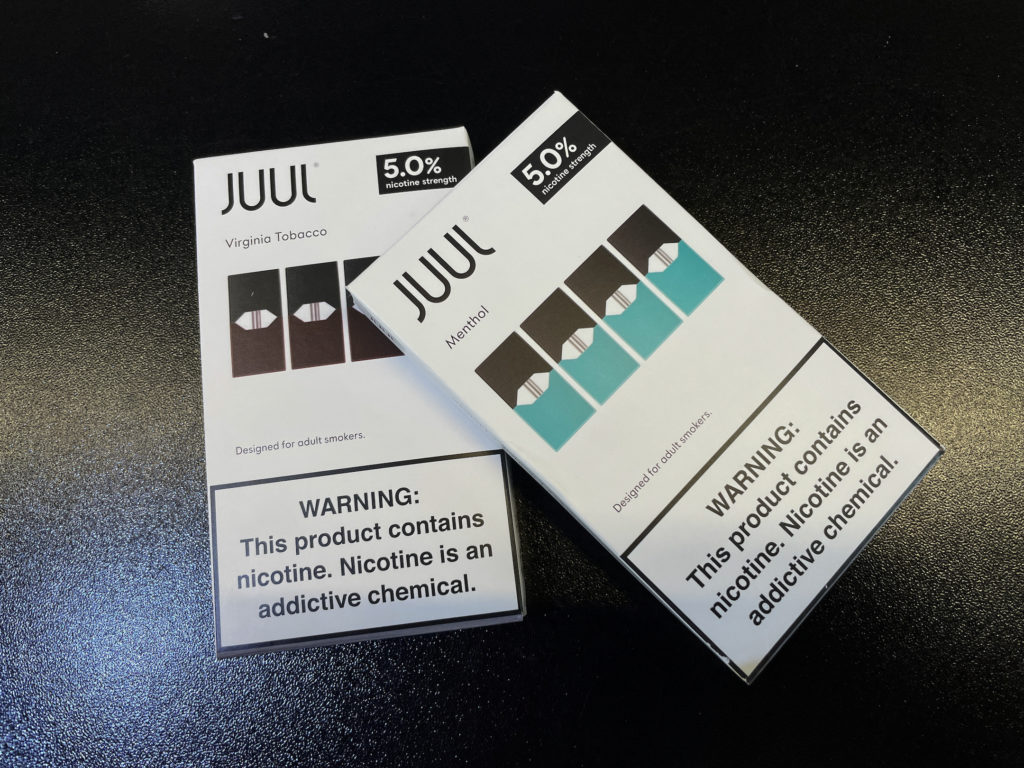FDA authorizes the sale of Juul’s tobacco and menthol e-cigarettes, after previous ban

By Melissa Patrick
Kentucky Health News
The U.S. Food and Drug Administration has authorized the sale of Juul Labs’ e-cigarettes, which had been banned previously out of concerns for the company’s role in the youth vaping epidemic.
The FDA made the announcement July 17 after “an extensive scientific review” that showed Juul’s e-cigarettes are less harmful for adult smokers, and that they can benefit from switching to vaping.
The FDA authorized the marketing of Juul’s original e-cigarette device as well as refill cartridges in tobacco and menthol flavors.
“Regarding these specific products, the applicant submitted robust data—including a two-year longitudinal cohort study — demonstrating high rates of adults completely switching from cigarettes to either the tobacco- or menthol-flavored Juul products,” according to an agency news release.
That said, the FDA went on to discourage the use of the products, saying, “While today’s actions permit these specific e-cigarette products to be legally marketed in the U.S. to adults 21 and older, it does not mean these tobacco products are safe, nor are they FDA approved.”
The FDA banned Juul products from the market in June 2022. Juul sued, and federal judges temporarily stayed the FDA’s order while the agency conducted further review of Juul’s marketing application. In 2024, the FDA rescinded the ban, which reinstated the company’s application for scientific review. And on June 17, the FDA approved the sale of certain Juul products.
All electronic cigarette products are required to have FDA authorization to be legally marketed, and the companies must submit scientific evidence to show their products are “appropriate for the protection of pubic health” before they are allowed on the market.
While Juul’s product sales were suspended, it paid billions of dollars to resolve thousands of lawsuits alleging the company marketed its products toward youth. Kentucky received $14 million to be delivered over several years from a $435 million settlement, divided among 33 states and Puerto Rico. A bill was filed during the last legislative session to require the remaining portion of Kentucky’s settlement money, which totals about $7.2 million over six years, to go into a trust fund with the sole purpose of being used for youth vaping prevention and cessation. The bill failed to receive a committee hearing.
Juul applauded the FDA’s marketing authorization, saying its focus is on “making the cigarette obsolete.”
“Americans who use nicotine deserve a reliable marketplace where they can confidently choose from an array of FDA-authorized smokefree nicotine products,” Juul said in a statement. “These products must be backed by rigorous research, manufactured in regularly inspected facilities, authorized by FDA before introduction to the market, and then marketed and sold responsibly to adults. We fully support FDA in its mission to create such a market.”
Anti-tobacco groups disagreed, voicing concerns about how this decision could negatively impact youth vaping.
The American Lung Association’s President and CEO Harold Wimmer said in a statement that he was “deeply troubled” by this decision, especially around the decision to allow Juul to sell its menthol flavor.
“Juul hooked a generation of kids on tobacco through flavored products, youth-targeted marketing, and high levels of nicotine, and remains popular today. Juul has already agreed to pay more than $1 billion in settlements for its role in addicting a generation of kids,” Wimmer said. “Ending the sale of Juul and all flavored e-cigarette products, including menthol, is the clear path to ending youth vaping for good.”
Yolonda C. Richardson, president and CEO of Campaign for Tobacco-Free Kids, agreed, calling on the FDA to deny marketing applications for flavored e-cigarettes and to step up enforcement efforts against the many illegal products that are currently on the market.
“It is a big step in the wrong direction to authorize sales of the product that was responsible for this public health crisis in the first place,” Richardson said in a press release. “There is no question that this crisis was driven by Juul’s sleek, easy-to-hide products, which were sold in enticing flavors, including menthol, were marketed in ways that appeal to kids, and delivered massive doses of nicotine that can quickly addict kids.”